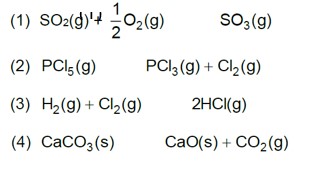7.78. Assertion: Salt does not dissolve in non-polar solvent.
Reason: For non-polar solvent, solvation enthalpy is small and not sufficient to overcome lattice enthalpy of the salt.
7.78. Assertion: Salt does not dissolve in non-polar solvent.
Reason: For non-polar solvent, solvation enthalpy is small and not sufficient to overcome lattice enthalpy of the salt.
(a) In case of a non-polar (covalent) solvent, solvation enthalpy is small and hence, not sufficient to overcome lattice enthalpy of the salt. Consequently, the salt does not dissolve in non-polar solvent. As a general rule, for a salt to be able to dissolve in a particular solvent its solvation en
Similar Questions for you
0.01 M NaOH,
M = 1 * 10-2

pOH = 2
pH = 2
Kp = Kc (RT)Dng
36 * 10–2 = Kc (0.0821 * 300)–1
Kc = 0.36 * 0.0821 * 300 = 8.86 » 9
A(g) ->B(g) + (g)
Initial moles n 0 &nbs
On increasing pressure, equilibrium moves in that direction where number of gaseous moles decreases.
Taking an Exam? Selecting a College?
Get authentic answers from experts, students and alumni that you won't find anywhere else.
On Shiksha, get access to
Learn more about...

Chemistry Ncert Solutions Class 11th 2023
View Exam DetailsMost viewed information
SummaryDidn't find the answer you were looking for?
Search from Shiksha's 1 lakh+ Topics
Ask Current Students, Alumni & our Experts
Have a question related to your career & education?
See what others like you are asking & answering


